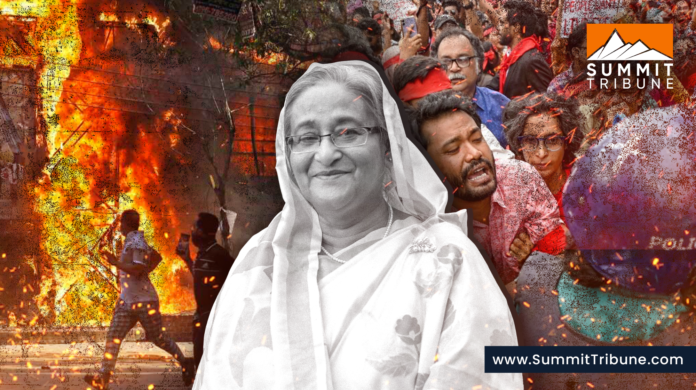
Bangladesh Prime Minister Sheikh Hasina resigned on Monday and left the country, as more people were killed in some of the worst violence since the birth of the South Asian nation more than five decades ago.
The source told,“She and her sister have left Ganabhaban (the Prime Minister’s official residence) for a safer place.”
Also Read: Sudan Army Chief Survives Deadly Drone Strike
“She wanted to record a speech. But she could not get an opportunity to do that,” the source said.
Bangladesh Army chief General Waker-Uz-Zaman announced PM Hasina’s resignation in a televised address to the nation and said an interim government would be formed.
The Army chief urged citizens to maintain peace and order, emphasizing that cooperation, rather than conflict, is key to preserving the nation’s progress.
General Waqar-uz-Zaman appealed to people to avoid violence and work together to sustain the country’s well-being.
Army chief Zaman said he had held “fruitful” talks with leaders of all major political parties he had “invited” and would soon meet President Mohammed Shahabuddin to discuss the way ahead.
“The country is going through a revolutionary period,” said Zaman, 58, who took over as army chief only on June 23.
“I promise you all, we will bring justice to all the murders and injustice. We request you to have faith in the army of the country. I take full responsibility and I assure you to not get disheartened,” he said.
“I request you all to be a little patient, give us some time and together we will be able to solve all the problems,” Zaman said. “Please don’t go back to the path of violence and please return to non-violent and peaceful ways.”
The address came after the deadly protests killed nearly 100 people were killed in fierce clashes taking the total death count to over 300.
Remember that more than 100 people killed on Sunday as protesters, calling for Prime Minister Sheikh Hasina’s resignation, clashed with security forces and supporters of the ruling party.
Last month, at least 150 people were killed and thousands injured in violence touched off by student groups protesting against reserved quotas in government jobs.
Weeks of Protest For Hasina to Step Down
The ‘Students Against Discrimination’ group, which was at the forefront of last month’s job quota protests, is leading the latest demonstrations.
The protests to reform the quota system paused after the Supreme Court scrapped most quotas on July 21. Protesters, however, returned last week demanding a public apology from Hasina for the violence, restoration of internet connections, reopening of college and university campuses and release of those arrested.
By the weekend, the demonstrations spiralled into a campaign seeking Hasina’s ouster as demonstrators demanded justice for people killed last month.
The students’ group called for a nationwide non-cooperation movement starting Sunday with a single-point agenda – Hasina must resign.
The protesters blame Hasina’s government for the violence during the protests in July. Hasina’s critics and rights groups have accused her government of using excessive force against protesters, a charge the government denies.
The MSCI index of shares around the rest of the region lost over 2%.
Hasina, 76, and her government initially said students were not involved in the violence during the quota protests and blamed the Islamic party, Jamaat-e-Islami, and the main opposition Bangladesh Nationalist Party (BNP) for the clashes and arson.
But after violence erupted again on Sunday, Hasina said that “those who are carrying out violence are not students but terrorists who are out to destabilise the nation”.
The students group has declined Hasina’s offer for talks to resolve the crisis.
Last month, at least 150 people were killed and thousands injured in violence touched off by student groups protesting against quotas for government jobs.
The government declared the indefinite nationwide curfew starting at 6 p.m. (1200 GMT) on Sunday and also announced a three-day general holiday starting from Monday.
Over the weekend, there have been attacks, vandalism and arson targeting government buildings, offices of the ruling Awami League party, police stations and houses of public representatives, local media reported. Violence was reported in 39 of the country’s 64 districts.
Bangladesh Railway said it had suspended all services indefinitely due to the escalating violence.
Garment factories in the country, which supply apparel to some of the top brands in the world, have also been closed indefinitely.
The role of the country’s army in tackling the violence had come into focus with a group of retired military officers urging Hasina to withdraw troops from the streets and undertake “political initiatives” to resolve the crisis.
Critics of Hasina, along with human rights groups, have accused her government of using excessive force against protesters, a charge she and her ministers deny.
Hasina had said that “those who are carrying out violence are not students but terrorists who are out to destabilise the nation”.








